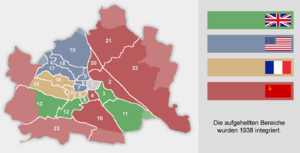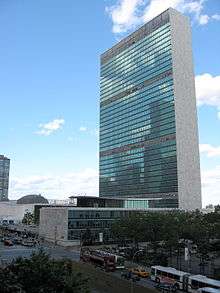International zone
An international zone is a type of extraterritoriality governed by international law, or similar treaty between two or more nations. The term can also refer to the areas of international airports outside customs and immigration controls. These areas often contain duty-free shopping, but they are not extraterritorial. In areas of conflict there may be international zones called green zones that form protective enclaves to keep diplomats safe. Countries in conflict may also have international zones separating each other.
Green Zone (Iraq)
Iraq has its international zone around the Republican Palace in central Baghdad in a crook of the Tigris River. This area was and still is the heavily fortified headquarters for the coalition and Iraqi Reconstruction Ministries. The official name started as the "Green Zone" but was later changed to the "International Zone" in June 2004 with the return of sovereignty to the Iraqi people.[1][2]
Vienna after World War II

French, British, American and Soviet troops divided Vienna into four zones, and a small international zone of the historical center of Vienna was governed in rotation by troops of those countries
International airports
All International airports have international zones for individuals who have not cleared customs and immigration of the hosting country.[3][4] [5]
United Nations Headquarters

The headquarters of the United Nations is a complex in New York City that exists on international territory. The territory is administered by the United Nations, but is still subjected to most local, state, and federal laws.[6] The United Nations has three additional, subsidiary, regional headquarters or headquarter districts. These are located in Geneva (Switzerland), Vienna (Austria), and Nairobi (Kenya).[7] These adjunct offices also enjoy certain extraterritorial privileges.
Channel Tunnel
The United Kingdom and France established "international zones" or "control zones" at both ends of the Channel Tunnel, which crosses underneath the English Channel. British authorities exercise authority within the control zone on the French side, and French authorities exercise authority within the control zone on the UK side. Violations in the control zone are treated as if they occurred within the territory of the adjoining state within that zone, and extradition is not required to remove a violator to the operating state for prosecution. Officers of the adjoining state may carry firearms within the control zone.[8]
Tangier
The city of Tangier, Morocco, was an international zone from 1912 to 1956.[9]
Ottawa Civic Hospital, Canada
Princess Margriet of the Netherlands was born in Ottawa, Canada,[10] as the family had been living in there since June 1940 after the occupation of the Netherlands by Germany. The maternity ward of Ottawa Civic Hospital in which Princess Margriet was born was temporarily declared to be extraterritorial by the Canadian government.[11] Making the maternity ward outside of the Canadian domain caused it to be unaffiliated with any jurisdiction and technically international territory.[12] This was done to ensure that the newborn Princess would derive her citizenship from her mother only, thus making her solely Dutch and still viable for the Dutch line of succession to the throne.[13]
Proposals for Jerusalem
Under the 1947 United Nations Partition Plan for Palestine, the city of Jerusalem was supposed to become an International Zone. This was never implemented, the city becoming the scene of fierce fighting in 1948 which culminated with its partition between Israel and Jordan. Nineteen years later in 1967 the Jordanian occupied part was captured and unilaterally annexed by Israel. However, the idea of an international zone in Jerusalem, embracing at least the highly sensitive Old City of Jerusalem, continues to be floated by various would-be mediators.
See also
- Extraterritoriality
- Embassy
- Demilitarized zone
- Neutral territory
- EuroAirport Basel-Mulhouse-Freiburg
- Shanghai International Settlement
- Antarctic Treaty System
- Law of the Sea
- Outer Space Treaty
- Moon Treaty
- International waters
- Extraterrestrial real estate
- Free port
- Free trade zone
- Free trade area
References
- ↑ Global Security
- ↑ "The Struggle For Iraq; Frustration Unites Sunni And Shiite In Opposition To Baghdad Wall". New York Times. April 24, 2007.
A man who had waited in line for more than two hours to get into the fortified International Zone, formerly known as the Green Zone, on Monday said no one explained the reason for the delay to the nearly 200 people standing there. Why, why? What did I do? he said to no one in particular, as a soldier who had briefly appeared near the front of the line walked away.
- ↑ "Former Colleague Aided U.S. In Trapping Ex-C.I.A. Agent". New York Times. June 16, 1982.
After his arrival in the early evening, he met with Mr. Keiser, a lawyer from Geneva and several other associates, never leaving the international zone of the Zurich airport. Swiss Officials Alerted. The Swiss authorities, alerted about his travel plans by the United States, did not interfere with his movements. Several United States marshals shadowed Mr. Wilson on his 24-hour stopover at the airport.
- ↑ "Fugitive Former Spy; Lured Out Of Libya, Arrested At Kennedy". New York Times. August 26, 1981.
Presumably confident, Mr. Wilson left Tripoli several days ago on his way to the Dominican Republic, with brief stops in Switzerland and Madrid. Law-enforcement officials said that Mr. Wilson, traveling under an assumed name on the Irish passport, never left the international zone of the two European airports. He made several calls to bankers while in Switzerland, they said.
- ↑ "Team Of Ex-Green Berets Trained Terrorists For Libyan Government". New York Times. June 27, 1982.
In Washington, on July 25, Mr. Thompson and three former Green Berets were given travel documents, $1,000 in cash, airplane tickets to Zurich via New York, and a description of a man who would meet them at the Zurich airport. We were told to stay in the international zone and not to go through customs in Zurich, Mr. Thompson said.
- ↑ Kelsen, Hans (2000). The law of the United Nations: a critical analysis of its fundamental problems. The Lawbook Exchange, Ltd. p. 350. ISBN 1-58477-077-5.
- ↑ "Welcome to the United Nations Office at Vienna!". United Nations. Retrieved 24 October 2011.
- ↑ "Channel Tunnel (International Arrangements) Order 1993 (Hansard, 5 July 1993)". hansard.millbanksystems.com. Retrieved 2016-07-22.
- ↑ "Hassan II of Morocco Dies at 70; A Monarch Oriented to the West". New York Times. July 24, 1999.
Moulay Hassan ben Mohammed Alaoui was born on July 9, 1929, the oldest of six children of Sultan Sidi Mohammed ben Youssef. Most of Morocco was then a protectorate of France, except for sections governed by Spain in the northwest and southern coast and the city of Tangier, an international zone.
- ↑ Place of birth
- ↑ CBC Digital Archives - Second World War - 1943: Netherlands' Princess Margriet born in Ottawa
- ↑ Canadian Heritage - Government of Canada
- ↑ Canadian Heritage - Government of Canada